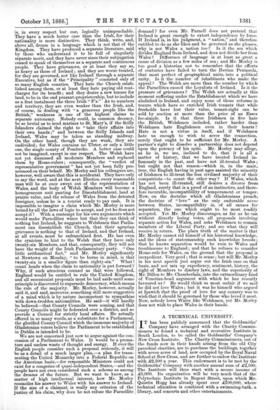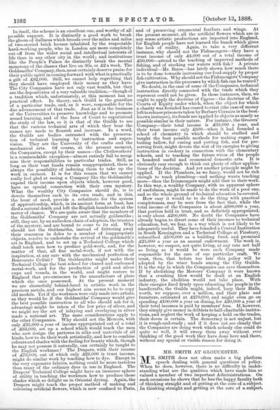A TECHNICAL UNIVERSITY.
IT has been publicly announced that the Goldsmiths' Company have arranged with the Charity Commis- sioners to found a technical and recreative Institute in South London, to be called the Goldsmiths' Company's New Cross Institute. The Charity Commissioners, out of the funds now in their hands arising from the old City parochial charities, are to purchase the buildings, together with seven acres of land, now occupied by the Royal Naval School at New Cross, and are further to endow the Institute with .22,500 a year. This endowment is to be met by the Goldsmiths' Company with another annual sum of .22,500. The Institute will thus start with a secure income of .25,000. Its organisation will be very much that of the Polytechnic Institute in Regent Street, upon which Mr. Quintin Hogg has already spent over .2100,000, where technical education is combined with a swimming-bath, a library, and concerts and other entertainments. In itself, the scheme is an excellent one, and worthy of all po3sible. support. It is distinctly a good work to break the gloom of dullness which broods over the miles and miles of two-storied brick houses inhabited by the respectable hard-working people, who in London are more completely cut off from the wider social and intellectual interests of life than in any other city in the world ; and institutions like the People's Palace do distinctly break the mental monotony of the classes that live on 30s. or -22 a week. The Goldsmiths' Company, then, most certainly deserve praise for their public spirit in coming forward with what is practically a gift of £82,000. Still, we cannot help regretting that they should have employed. their money as they have. • The City Companies have not only vast wealth, but they are the depositories of a very valuable tradition,—though of a tradition which, unfortunately, at this moment has no practical effect. In theory, each Guild is the guardian of a particular trade, and, as it were, responsible for the due advancement of that trade. Just as it is the business of the Universities to preserve knowledge and to promote sound. learning, and. of the Inns of Court to superintend the study of the law, so it is that of the Guilds to see that the various technical arts of which they bear the names are made to flourish and. increase. In a word, the Guilds are bodies entrusted with the preserva- tion of technical learning by instruction and super- vision. They are the University of the crafts and the mechanical arts. Of course, at the present moment, the Companies, except by their names—the Clothworkers' is a commendable exception,--almost entirely fail to recog- nise their responsibilities to particular trades. Still, as long as their vast funds remain unappropriated, there is 'always the possibility of inducing them to take up the work in earnest. It is for this reason that we cannot really feel glad. at seeing a Company like the Goldsmiths' expend their income upon objects which, however good, have no special connection with their own mystery. What the wealthy City Companies should do, is to devote themselves each to its own trade, and in this, the hour of need, provide a Substitute for the system of apprenticeship, which, in its ancient form at least, has died a natural death and left the English handicrafts at the mercy of chance. We are quite aware that the members of the Goldsmiths' Company are not actually goldsmiths ; still, they are, by an unbroken chain of adoption, the trustees of the mystery, and are bound to come to its aid. Why should not the Goldsmiths, instead of frittering away their resources in doles to a number of ' inappropriate objects, resolve to undertake the revival of the goldsmith's art in England, and to set up a Technical College which .shall teach men how to produce gold-work, and, for the matter of that, all fine metal-work, if not with the inspiration, at any rate with the mechanical perfection of Benvenuto Cellini ? The Goldsmiths might make their • Technical College the best school for chased and embossed metal-work, and for the production of gold and silver cups and vessels, in the world, and might restore to England that pre-eminence in the manufacture of plate which she once possessed. At the present moment we are shamefully behind-hand. in artistic work in the precious metals, and our highest aim seems to be to copy old models. Yet if the workmen were only made into artists, as they would be if the Goldsmiths' Company would give the best possible instruction to all who should ask for it, advantage might be taken of the low price of silver, and we might see the art of inlaying and overlaying in silver made a national art. The same considerations apply to the other Companies. Why should not the Mercers, with only £35,000 a year of income appropriated. out of a total of £83,000, set up a school which would teach the men who now design the patterns in silks and materials of all kinds, how to do their work artistically, and how to combine colours and shades with the feeling for beauty which, though he may not possess it naturally, can certainly be taught to the English workman? The Drapers, with their income of 479,000, out of which only £28,000 is trust income, .might do similar, work by teaching how to dye. Except in the very expensive fabrics, nothing could be more tasteless than many of the ordinary dyes in use in England. The Drapers' Technical College might have an immense sphere • of utility in teaching the workmen how to produce those shades which so delight us in Oriental dyeing. Again, the Drapers might teach the proper method of making and colouring artificial flowers, which is now confined to Paris, and of preserving ornamental feathers and wings. At the present moment, all the artificial flowers which are in any sense artistic productions are imported into England, for English people have not learned the knack which gives the look of reality. Again, to take a very different instance, why should not the Fishmongers—they have a trust income of only £4,000 out of a total income of .250,000—attend to the teaching. of improved methods of fishing, and of stocking our waters with fish ? A private individual—Mr. Baths—has lately shown how much there is to be done towards increasing our food-supply by proper fish cultivation. Why should not the Fishmongers' Company give instruction in the processes by which fish can be reared? No doubt, in the case of some of the Companies, technical instruction directly connected with the trade which they represent could not be given. In these instances, then, we ought to apply the doctrine of Cypres—the doctrine of the Courts of Equity under which, when the object for which a charity was founded has ceased to exist (the case of money left to release prisoners taken by Barbary Corsairs is the best- known instance), its funds are applied to objects as nearly as possible similar in their nature. For instance, the Grocers' Company—their total income is £38,000 a year, and their trust income only .2500—when it had founded a school of chemistry in. which should be studied. and. taught the best possible methods for making sugar, for boiling tallow, for curing and potting fish, and for pre- serving fruit, might devote the rest of its energies to giving instruction in cookery in connection with the elementary schools, and to teaching the future wives of the people a hundred useful and economical domestic arts. It is obviously easy enough to think out plenty of other applica- tions of the doctrine. And yet another principle might be applied. If the Plumbers, as we fancy, would not be rich enough to teach plumbing—and nothing wants teaching more—then the Ironmongers might add that to their work. In this way, a wealthy Company, with no apparent sphere of usefulness, might be made to do the work of a poor one, and so the whole ground of technical education be covered.
How easy it would be to do the thing with practical completeness, may be seen from the fact that, while the total income of the Companies is about £800,000 a year, that portion held in trust, and so definitely appropriated, is only about £200,000. No doubt the Companies have already begun to divert some of their incomes to technical education, bat, we fear, in a way which is not likely to be adequately useful. They have founded a Central Institution in South Kensington and a Technical College at Finsbury, subscribed £100,000 as a building fund, and promised. £25,000 a year as an annual endowment. The work is, however, we suspect, not quite living, at any rate not half so living as it would be were each Company made responsible for the care of one particular craft. We trust, then, that before too late this policy will be adopted. by the wiser heads among the City Guilds. It is the way in which the Companies can save themselves. If by abolishing the Mercers' Company it were known that a crushing blow would be dealt at an English industry, the abolition would not take place. With their energies fixed firmly upon educating the people in the handicrafts, the Guilds might, indeed, keep their Halls, worth, we suppose, over a million, and their plate and. furniture, estimated at £270,000, and might even go on spending £100,000 a year on dining, for £20,000 a year of their total incomes is paid by members' fees. If, however, they simply give money in driblets to half-charitable institu- tions, and neglect the work of keeping a hold on the trades, their doom is certain. The democracy is not unjust, but it is rough-and-ready ; and if it does not see clearly that the Companies are doing work which nobody else could do quite- so well, it will sweep them away without ever thinking of the good work they have done here and. there, without any special or visible reason for doing it.



















































 Previous page
Previous page